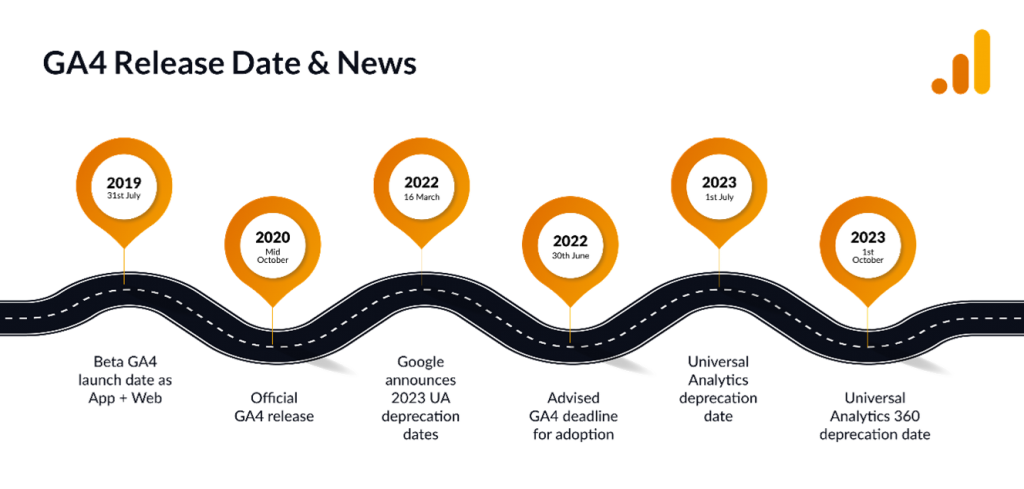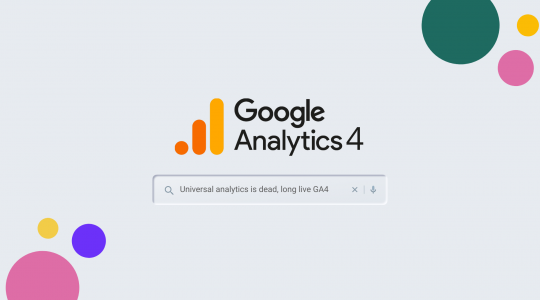Universal Analytics is dead, long live GA4
Businesses need to act now for the ongoing retirement of Universal Analytics and the implementation of game-changing Google Analytics 4 (GA4)
Google Analytics remains the biggest player globally across web analytics software tools in use today. It’s why when Google introduces a big change, it’s a big deal.
And this time with GA4, Google is serious.
Be in no doubt, the GA4 replacement is less of an update and more of a seismic change. With Google already amid the transition, you need to start acting immediately. For most consumer businesses this is a steep learning curve.
The importance of analytics has never been greater. As far back as Google Analytics 10th birthday in 2015, it’s estimated the data tracking tool was used by 52.9% of all websites on the internet, more than 10 times the next most popular analytics option, according to W3Techs. SimilarTech service estimates during that period a little more than 48 million websites were using Google Analytics. Since then, its popularity has only proliferated.
“50% of businesses say big data and analytics have fundamentally changed business practices in their sales and marketing departments” – Forbes
The arrival of Google Analytics 4 (GA4) reflects the ongoing significance of analytics for business, the ascendency of big data, and a wider privacy and data protection regulatory landscape that is rapidly being overhauled to protect consumers worldwide. From ‘conscious advertising’ and digital charters to Apple’s App Tracking Transparency (ATT) policy and Google’s Privacy Sandbox, markets are being more closely monitored and governed.
Staying up-to-date with these changes and controls remains vital for businesses to succeed, generate the key insights they need for growth and develop consumer trust. To steer through the changing ecosystem and escalation of data, more businesses are investing in analytics. Below we focus on what GA4 means for business, why you need to be ready now, what’s new and how to adapt to an analytics revolution.
What is GA4?
Google Analytics 4 (GA4) is the new analytics property type from Google that is in the process of replacing Universal Analytics (UA). Universal Analytics will stop collecting new data between 1st July and the end of the year (2023) for GA customers. It’s worth noting there is no free alternative to GA4 that offers the same insight-level of granularity.

Google Analytics started from Google’s purchase of ‘Urchin’ software in early 2005. Although the look and feel of UA has altered over the last 10 years (and before that Classic Google Analytics and Urchin Analytics) the approach has been largely the same. The reports, the data schema, and how you implement them has been consistent.
GA4 is hugely different, and significantly better. It is an entirely new platform with a modern underlying architecture that is more future-proof and built on technology that supports a logical, structured approach. Originally called ‘App + Web’ in its beta version, it tracks app and web data holistically in a single property, uses events rather than page views and incorporates higher sampling limits and machine learning.
“79% of enterprise execs say that companies who don’t embrace big data will lose their competitive position & could face extinction. Even more, 83%, have pursued big data projects to seize a competitive edge” – Accenture
Why you need to begin the transition now
Think about GA4 as a comprehensively different data model – a root and branch replacement. GA4 is already in the process of implementation so the time to act is now.
If your current UA reports are highly customised it’s imperative that you act as soon as possible to migrate and configure equivalent views in GA4. Some data, in some cases, may also be difficult to replicate meaning year-on-year metrics could be skewed and delay your ability to track campaign impact. To increase effectiveness, it is important for you to benchmark which criteria are critical for you to unlock business value.
What’s new?
The next generation of Google Analytics is a resilient, privacy-first interface (it no longer stores IP addresses) structured to scale with business growth and uses cross-channel measurement to predict performance and key action through Google and beyond. Its objective is to create a consistent, user-centric platform that you can apply across apps and web.
As discussed, GA4 mirrors the impact of major new regulatory changes such as GDPR and CCPA as users demand more control over how data is collected and used for goals such as personalised ads. Consumer privacy means heightened controls around browser updates, third-party cookies, and specific device identifiers.
Adopting GA4 means tracking will rely less on cookies and enable greater insight into customer journeys across devices and sessions. With a different device ID or Google account sign-in, GA4 offers you new ways of retargeting users in line with new industry standards.
“GA4 mirrors the impact of major new regulatory changes such as GDPR and CCPA as users demand more control over how data is collected”
Here are three key ways Google is radically transforming the gold standard – and future – of web analytics:
- Machine learning: GA4 is built with innovative machine learning and AI capabilities at its core to fill in data gaps and uncover insights to make recommendations that drive your ROI.
- Customer life cycle: New functionality enables a more complete understanding of the customer journey across devices, from acquisition to retention via web and app. For example, predictive audience features and shorter data-driven analysis windows mean you can act quickly and accurately to drive business performance.
- Built to last: Cookies or no cookies and identifiers, GA4 is smart enough to fill in the gaps, so you can learn about your customers and build sustainably.
Event tracking and parameters will mean the end of a session-based data model – in GA4 everything is an event, even page views. New parameters also mean there are way more ways to track elements such as video or scroll depth. The bounce rate is gone, now replaced with ‘engaged sessions’ for a deeper understanding of the customer experience.
There is now a Google consent mode, attribution has changed from just being last click and segments get a refresh with more granular and specific ‘comparisons’. It means a fundamental change for you in generating more effective, customised reporting.
Why does GA4 matter?
Google Analytics is still the most popular business analytics tool out there. For the UK legal services sector, consumer data is spread across an increasing myriad of touchpoints and platforms, so it’s never been more business-critical to use GA to navigate your data.
To provide and measure valuable data for analysis of digital campaigns from digital pr and SEO to PPC, social media and more, it remains a vital part of your analytics toolbox.
GA4 is now the main property type in Google Analytics. It’s the default. So, if you are creating a new property in your account, it’s a GA4 property.
Using GA4 in parallel with your other legal services insight tools such as Blume’s proprietary lead generation platform will put you in a strong position to compete effectively in the market with a sustainable lead mix.
How do I get ready?
As of March 2023, if you haven’t already created a GA4 property, Google Analytics will have created one for you based on your Universal Analytics Property.
The next steps are to go over to the GA4 Demo account from the Google Store. This is where you can get involved with the new property and begin handling real GA4 data.
This is a new dawn for analytical power with powerful new tools such as AI and machine learning leading the way to help your business achieve its goals.
5 key takeaways
- Google Analytics 4 differs entirely from Universal Analytics in approach, look and feel. It’s a wholesale replacement and not a transition.
- Businesses should make the switch now, Google has already begun the transition, limiting the opportunity to take a few months to prepare, plan and implement new data modeling and reporting
- GA4 collates data across devices from web and apps in one property
- New capabilities include a shift to events tracking, machine learning, and AI, and higher sampling limits
- Key elements of GA4 have been built to be future-proof and reflect significant and sweeping new privacy-first regulatory changes such as GDPR and CCPA
Working with Blume
Blume is committed to helping businesses plan for the latest challenges around digital marketing and technology. With a rigorous approach to discovery and planning, we monitor trends closely that impact businesses, to elicit key information our partners need to drive growth, innovation, and profitability. We create a path for businesses in regulated consumer services sectors to achieve success and keep their enterprises and customers safe and informed.




